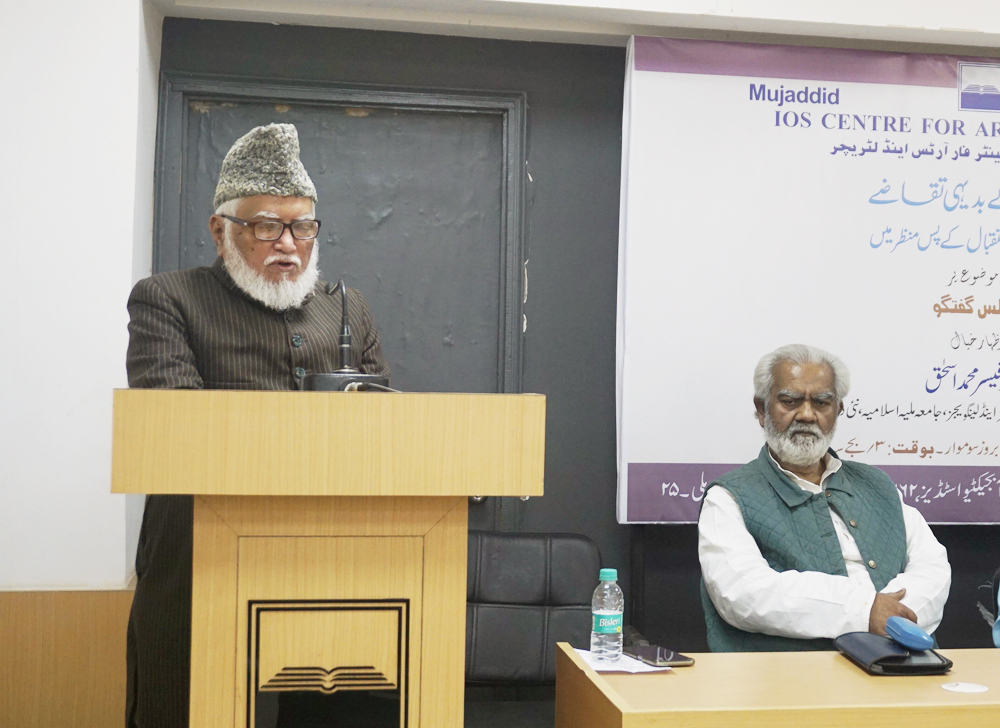Mujaddid IOS Centre for Arts & Literature organises discussion on “Manifest Requirements of Tawhid”
Mujaddid IOS Centre for Arts & Literature organises discussion on “Manifest Requirements of Tawhid”
New Delhi: A discussion on the “Manifest Requirements of Tawhid: In the context of welcome to the month of fasting (Tawhid ke Badeehi Taqaaze: Mah-i-Siyam ke Istaqbal ke Pasmanzar mein)” was organized by the Mujaddid IOS Centre for Arts and Literature at the IOS auditorium on March 11, 2024.
Convenor of the Centre, Anjum Naim introduced the topic by briefly highlighting the importance of the month of Ramadhan.
Prof. Mohammad Ishaq, former dean, faculty of humanities and languages, Jamia Millia Islamia, New Delhi, was the main speaker who said the faith in Tawhid (oneness of God) is the core of the fundamental beliefs of Islam. This is the essence of Imaan (faith) and the strong foundation of Islam. Rest of the beliefs are parts of Iman that make it complete. The entire building of all the Islamic beliefs and actions rests on Iman Billah (Belief in God). The strength of all actions and laws emanates from Allah. We have belief in Angels because they are His creatures and perform their duties in the universe on His command. We have belief in Messengers (Rasool) because they brought Allah’s message for the human kind. He observed that we have belief in the Holy books because they are based on the commands of Allah.
Prof. Ishaq noted that only the holy Qur’an is preserved in its original form and we are bound to spend our life according to the commands enshrined in the Holy Book. Similarly, we have belief in the life hereafter because Allah is the Master of the Day of Judgment who will dispense justice to human beings in accordance with their deeds. All the actions are done to seek the pleasure of our Master. He said that Allah made the human being superior to rest of the creatures and invested him with the nature of virtue and vice, benediction and evil, submission and disdain, endurance and blemish. Both types of abilities and qualities are equally infused by God in human beings. As a consequence, an individual could do virtue and vice, both. Meaning thereby it is possible for a man to do virtue or vice. He said that in spite of this, if one chooses virtue, he could make his life and its moments successful by his qualities and obedience to Allah. By his actions he could seek the closeness of Allah. This is a big sign of being noble and kind. Explaining the main purpose of fasting, he observed that forbearance and sobriety were the main elements of the month-long exercise.
Prof. Ishaq held that in Qur’an, Allah commanded the faithful to observe fast as it has been made obligatory on them like the followers of other religions before the advent of Islam. Fast has been made obligatory so that the faithful could become pious during the days which are numbered. Abstinence means preventing desires from tending towards evils and fasting is the potential tool of it. Referring to a Sahabi (companion of the Prophet [PBUH]), who once approached the Prophet and asked Him to direct him to do something which could please Allah, so that he could get the blessings of Allah. The Prophet (PBUH) asked him to observe fast. He said that no other deed than fasting could match it. He said that the arrival of the month of Ramadhan was welcome. This month is the spring season of rectitude and obedience. That is why the month of Ramadhan is full of magnificence, superiority and profusion compared to other months of the Islamic calendar. During this month, Allah bestows His pleasure, love, gift, guarantee, kindness and radiance on the faithful. The quantum of reward for each act of piety during Ramadhan is increased manifold, he remarked.
Prof. Ishaq maintained that if the fast is observed with faith and a sense of accountability, all the sins committed in the past could be forgiven with the blessings of Allah. Similarly, all the past Saghirah sins are forgiven if the Tarawih (A prayer offered at night after Isha) is offered by the believer. In this month, one act of righteousness carries reward equal to the Farz prayer and offering the Farz prayer carried reward seventy times. This month has a night called Shab-e-Qadr which has been declared to the better than one thousand months. Fasting during Ramadhan is obligatory and the Taraweeh prayer is optional (Sunnah Moakkidah). Ramadhan is the month of forbearance and the reward for this is Jannah. This is the month of sympathy and charity. In this month, sustenance for a Muslim is increased. One who arranges Iftar for a fasting Muslim, will get reward equal to the latter in the form of absolution, forgiveness from sins and liberation from Jehannum (Hell). This month is divided into three phases. Each phase consisting of 10 days is called Ashrah. While the first Ashrah is devoted to Rahmah, the second Ashrah is for Maghfirat (forgiveness) and the third is for liberation from Jehannum, he added.

Presiding over the discussion, former professor of Arabic, English and Foreign Languages University, Hyderabad, Prof. Mohsin Usmani, said that Tawhid and Shirk were contradictory to each other. He observed that Muslims were duty-bound to call for Tawhid for liberating the world and humanity from the scourge of Shirk (Accepting other divinities or powers alongside God as associates). It should always be kept in mind that only Tawhid was core to the Islamic belief.
At the end of the discussion, the assistant secretary general of the IOS, Prof. Haseena Hashia extended a vote of thanks to the attendees.
A view of audience
Go Back